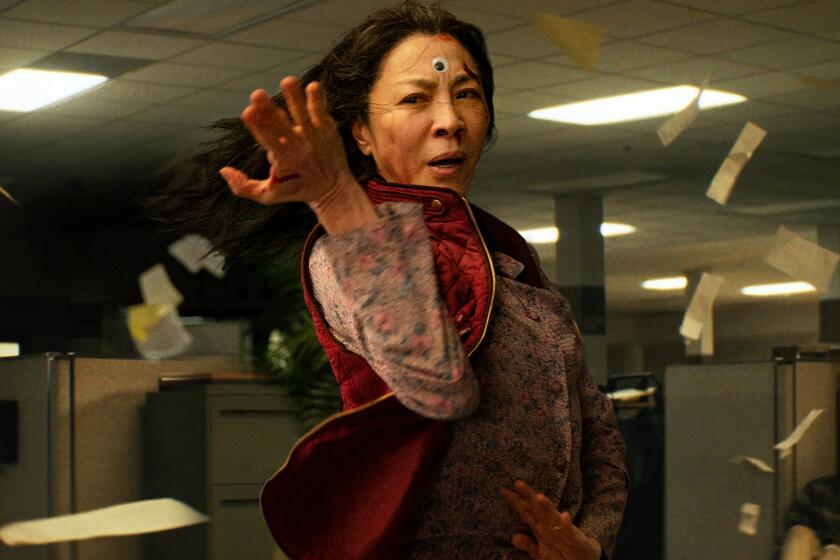Same-day streaming film releases are ‘dead,’ cinema group leader says

- Share via
It’s not exactly a secret. Movie theater operators hate it when Hollywood studios release films for home viewing and in cinemas at the same time. It kills their box office and encourages piracy, they say.
Nonetheless, during the COVID-19 pandemic, studios — including Warner Bros., Universal Pictures and the Walt Disney Co. — experimented with simultaneous releases to boost their streaming businesses.
On Tuesday, the head of the trade group that represents movie theaters pronounced such strategies “dead.”
“I am pleased to announce that simultaneous release is dead as a serious business model, and piracy is what killed it,” said John Fithian, president of the National Assn. of Theatre Owners, at CinemaCon, the cinema business’ annual convention.
Fithian was speaking to a receptive audience. At CinemaCon, which takes place at Caesars Palace in Las Vegas, there’s no surer applause line than a rallying cry for the time-honored practice of releasing movies in theaters first.
Before the pandemic shuttered theaters, movies played in cinemas for an average of 90 days before becoming available in the home. This is widely seen as essential to theaters’ business model.
Are movie theaters back for real this time?
But studios adapted to the health crisis by experimenting with different strategies. Warner Bros., then owned by AT&T, sent its entire 2021 film slate to sister streaming service HBO Max and to theaters simultaneously. Disney released movies such as “Black Widow” and “Raya and the Last Dragon” on Disney+ for a $30 fee.
Now there are signs that the practice is becoming a relic of the pandemic. Warner Bros. and other studios have committed to releasing movies in theaters for 45 days before taking them to streaming or video on demand. Disney has remained outwardly flexible in its strategy, releasing some movies to Disney+ for no extra charge, including Pixar’s “Turning Red.” But it’s next Pixar film, “Lightyear,” is exclusive to theaters.
Although the same-day release tactic allowed streaming services to expand subscriber counts with new movies, it also resulted in rampant piracy, Fithian said. His remarks followed a lengthy presentation by the Motion Picture Assn.’s chief executive, Charles Rivkin, about the growing sophistication of digital piracy operations and the measures the trade organization is taking to curb them.
“Robust theatrical windows protect against piracy,” Fithian said. “If a major title that people are clamoring to see in theaters is released too quickly to the home and then pirated, the temptation to stay home and watch pirated films becomes greater for many potential moviegoers.”
Streaming just had its worst week ever. But what does cinema have to gloat about?
There are growing signs that studio owners have come around to theater operators’ view.
Warner Bros. Discovery Chief Executive David Zaslav, speaking to investors Tuesday morning, indicated he thinks movies that debuts in theaters first are more valuable to the company. In studying whether the studio should further collapse theatrical windows for streaming, data led him to conclude: “No way.”
Zaslav took over Warner Bros. this month as a result of AT&T spinning off WarnerMedia assets to merge them with Discovery. In his remarks discussing the company’s quarterly earnings, Zaslav cited the release of Matt Reeves’ “The Batman” as an example of how a theatrical release improves a film’s financial prospects.
“When you open a movie in the theaters, it has a whole stream of monetization,” Zaslav said. “But more importantly, it’s marketed and it builds a brand. And so when it does go to the streaming service, there’s a view that that has a higher quality.”
This year’s CinemaCon comes as exhibitors are laboring to recover from the doldrums of the pandemic, when studios continued to delay big films that might bring audiences back to auditoriums. Box office in the U.S. and Canada is projected to reach $9 billion this year, more than double last year’s tally but still down 20% from 2019 levels.
There’s growing optimism that theaters will continue to see revenue growth in the coming months thanks to such potential blockbusters as “Top Gun: Maverick,” “Lightyear” and “Minions: The Rise of Gru.”
Tom Rothman, chairman of Sony’s motion picture group, set the tone for the festivities Monday night, joking to the assembled theater owners by mocking the most pessimistic predictions of the future of cinema. “What are you guys doing here?” he asked from the Colosseum stage. “Don’t you know you’re dead?”
Rothman boasted about the $3.3 billion that Sony movies, including “Spider-Man: No Way Home” and “Uncharted,” grossed since the last CinemaCon, in August. During its presentation, Sony debuted footage from the Brad Pitt action movie “Bullet Train” and unfinished animation from “Spider-Man: Across the Spider-Verse.”
Additionally, Sony leaned further into its “Spider-Man” franchise, announcing music artist Bad Bunny as the star of “El Muerto,” an upcoming Marvel film based on an obscure comic book character. The picture will make Bad Bunny the first Latino lead of a live-action Marvel superhero film, Sony said.
More to Read
Inside the business of entertainment
The Wide Shot brings you news, analysis and insights on everything from streaming wars to production — and what it all means for the future.
You may occasionally receive promotional content from the Los Angeles Times.













